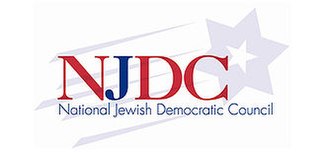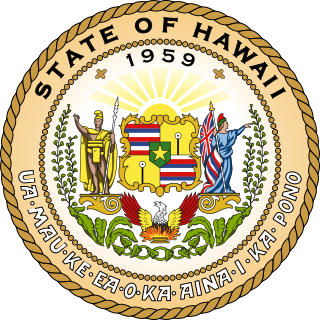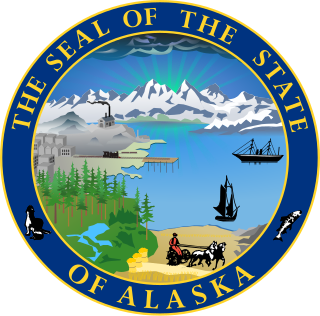
The Jewish Council for Public Affairs (JCPA) is an American Jewish nonprofit organization that advocates for progressive and liberal policies. Founded in 1944 as the umbrella organization for local Jewish advocacy arms known as community relations councils, for almost 80 years it represented approximately 125 local Jewish federations and community relations councils and was the coordinating body for 15 national Jewish organizations.
Reproductive Freedom for All, formerly NARAL Pro-Choice America and commonly known as simply NARAL, is a non-profit 501(c)(4) organization in the United States that engages in lobbying, political action, and advocacy efforts to oppose restrictions on abortion, to expand access to abortion and birth control, and to support paid parental leave and protection against pregnancy discrimination.

Gary Lee Bauer is an American civil servant, activist, and former political candidate. He served in President Ronald Reagan's administration as Under Secretary of Education and Chief Domestic Policy Advisor, and later became president of the Family Research Council and a senior vice president of Focus on the Family, both conservative Christian organizations. Bauer was a candidate in the 2000 Republican Party presidential primaries and participated in five national debates. He is known for his advocacy of religious liberty, support for Israel, and his dedication to electing conservative candidates to Congress.
The American Jewish Committee (AJC) is a Jewish advocacy group established on November 11, 1906. It is one of the oldest Jewish advocacy organizations and, according to The New York Times, is "widely regarded as the dean of American Jewish organizations". As of 2009, AJC envisions itself as the "Global Center for Jewish and Israel Advocacy".

The American Jewish Congress is an association of American Jews organized to defend Jewish interests at home and abroad through public policy advocacy, using diplomacy, legislation, and the courts.
The Religious Coalition for Reproductive Choice (RCRC) is an abortion rights organization founded in 1973 by clergy and lay leaders from mainline denominations and faith traditions to create an interfaith organization following Roe v. Wade, the 1973 U.S. Supreme Court decision legalizing abortion in the U.S. In 1993, the original name – the Religious Coalition for Abortion Rights (RCAR) – was changed to the Religious Coalition for Reproductive Choice.

The Religious Action Center (RAC) is the political and legislative outreach arm of Reform Judaism in the United States. The Religious Action Center is operated under the auspices of the Commission on Social Action of Reform Judaism, a joint body of the Central Conference of American Rabbis and the Union for Reform Judaism. It was founded in 1961.
The National Council of Jewish Women(NCJW) is a 501(c)(3) tax-exempt organization. Founded in 1893, NCJW is self-described as the oldest Jewish women's grassroots organization in the United States, currently comprising over 180,000 members. As of 2021, there are 60 sections in 30 states. Specifically, NCJW's policies address expanding abortion access, securing federal judicial appointments, promoting voting integrity, and mobilizing Israeli feminist movements. These objectives are achieved through lobbying, research, education, and community engagement. NCJW's headquarters are located in Washington, D.C., and the organization maintains offices in numerous other cities in the U.S. as well as in Israel.
Abortion in Israel is permitted when determined by a termination committee, with the vast majority of cases being approved, as of 2019. The rate of abortion in Israel has steadily declined since 1988, and compared to the rest of the world, abortion rates in Israel are moderate. According to government data, in Israel, abortion rates in 2016 dropped steadily to 9 per 1,000 women of childbearing age, lower than England (16.2) and the United States (13.2). 99% of abortions are carried out in the first trimester. Despite allegations of permitting abortion under limited circumstances, Haaretz noted in 2019 that this is not the case, and abortion is almost always permitted in Israel.

The National Jewish Democratic Council (NJDC) was a political lobbying organization that advocated within the Democratic Party for viewpoints aligned with the American Jewish community and in support of the state of Israel, and within the political process generally, between 1990 and about 2016.
J Street is a nonprofit liberal advocacy group based in the United States whose stated aim is to promote American leadership to end the Arab–Israeli and Israeli–Palestinian conflicts peacefully and diplomatically. J Street was incorporated on November 29, 2007.

The 2024 United States Senate election in Nevada will be held on November 5, 2024, to elect a member of the United States Senate to represent the State of Nevada. Incumbent Democratic Senator Jacky Rosen, elected in 2018 over incumbent Republican Dean Heller, is seeking a second term in office. Primary elections are scheduled to take place on June 11, 2024.

The 2024 United States Senate election in Ohio will be held on November 5, 2024, to elect a member of the United States Senate to represent the state of Ohio. Primary elections took place on March 19, 2024. Incumbent Democratic Sherrod Brown is seeking a fourth term in office. Former luxury car dealer Bernie Moreno is the Republican nominee. This race is one of three 2024 U.S. Senate races in which Democratic senators are seeking re-election in states where Republican Donald Trump won both the 2016 and 2020 presidential elections. Brown's re-election is considered essential for Democrats' chances to retain the Senate majority in 2024.

The 2024 United States Senate election in Washington will be held on November 5, 2024, to elect a member of the United States Senate to represent the state of Washington. Incumbent four-term Democratic Senator Maria Cantwell was first elected in 2000, narrowly defeating Republican incumbent Slade Gorton. In her most recent re-election campaign, Cantwell won with 58.3% of the vote in 2018. Primary elections will take place on August 6, 2024.

The 2024 United States Senate election in Hawaii will be held on November 5, 2024, to elect a member of the United States Senate to represent the state of Hawaii. Incumbent two-term Democratic senator Mazie Hirono was re-elected with 71.2% of the vote in 2018. Hirono is running for a third term. Primary elections will take place on August 10, 2024.

The 2024 United States Senate election in New York will be held on November 5, 2024, to elect a member of the United States Senate to represent the state of New York. Primary elections will take place on June 25, 2024. Incumbent Democratic Senator Kirsten Gillibrand was appointed to the Senate in January 2009 after Hillary Clinton resigned to become Secretary of State under President Obama. Gillibrand won the 2010 special election to retain the Senate seat, won her first full term in 2012, and was re-elected with 67.0% of the vote in 2018.

The 2024 United States House of Representatives election in Alaska will be held on November 5, 2024, to elect a member of the United States House of Representatives to represent the state of Alaska from its at-large congressional district. The election will coincide with the 2024 U.S. presidential election, as well as other elections to the U.S. House, elections to the United States Senate, and various other state and local elections.
The 2024 United States House of Representatives elections in Massachusetts will be held on November 5, 2024, to elect the nine U.S. representatives from the State of Massachusetts, one from all nine of the state's congressional districts. The elections will coincide with the 2024 U.S. presidential election, as well as other elections to the House of Representatives, elections to the United States Senate, and various state and local elections. The primary elections are scheduled for September 3, 2024.

The 2024 United States House of Representatives elections in Rhode Island will be held on November 5, 2024, to elect the two U.S. representatives from the state of Rhode Island, one from each of the state's congressional districts. The elections will coincide with the 2024 U.S. presidential election, as well as other elections to the House of Representatives, elections to the United States Senate, and various state and local elections. The primary elections are scheduled for September 10, 2024.












